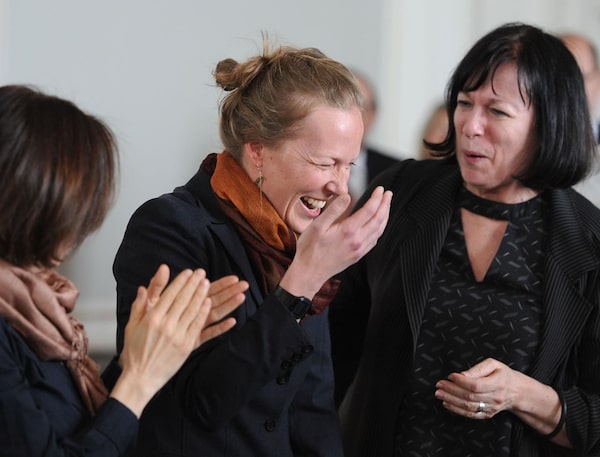
Author Kate Harris reacts after winning the $30,000 RBC Taylor Prize for her book Lands of Lost Borders: Out of Bounds on the Silk Road, in Toronto, Monday, March 4, 2019.The Canadian Press
After 20 years, one of the country’s foremost celebrations of literature, the RBC Taylor Prize for literary non-fiction, will come to an end in 2020. Writing in The Globe and Mail, prize founder Noreen Taylor explained the decision in terms of mission accomplished. It was not, she said, a funding decision. While industry insiders are expressing unanimous sadness at the loss, they also share a common frustration with incremental losses to the industry that began before the prize started.
As Taylor pointed out, non-fiction is thriving in Canada. BookNet’s 2018 report on the English-language print trade market in Canada shows non-fiction print sales represent a robust 33.5 per cent of the market (versus fiction’s 25.5 per cent). However, when you strip out international titles – including juggernauts such as Michelle Obama’s Becoming – from BookNet’s figures, the Canadian-authored non-fiction books being sold amount to only 4.9 per cent of the market.
Journalist and author Ken Whyte, who launched Sutherland House in 2018 to specialize in publishing non-fiction, laments the loss of “one of the very best” of Canada’s literary awards in an area where opportunities for writers have notably contracted over recent decades. “We’ve got a whole ton of independent publishers in Canada but very few with scale like General Publishing and McClelland & Stewart had 20 or 30 years ago,” Whyte says. “Even Key Porter – those were big houses and they operated fairly big budgets. Now we have a lot more small publishers, and they can’t afford to make the same investments in those big expensive projects.”
Hilary McMahon, executive vice-president at Westwood Creative Artists, echoed the sentiment. “Because advances have dropped so significantly, there are just a lot of [research-heavy non-fiction] books that aren’t getting published,” she says. “A prize can never be counted on – the author has to be able to take on the book with an advance.”
“A lot of that good non-fiction used to begin as long-form magazine pieces, long-form journalism in newspapers,” Whyte says. “Writers in those mediums had a lot more support, a lot more time.”
J.B. MacKinnon won the Taylor Prize in 2006 for Dead Man in Paradise and credits it with strengthening his self-confidence. “Instantly I would be taken seriously for any writing project,” he says. And yet, he believes that, despite the boost they give, prizes are ultimately “one of the weaker ways” to support good writing. “I’d rather see more mentorship and writer development,” he said. “Old-school stuff like strong relationships with editors who are not overburdened with work, better incubation of ambitious projects.”
In its later years, the Taylor Prize had begun to expand its program to address precisely this need, launching an emerging-writer award in 2014, followed by a mentorship program in 2017. Penguin Canada publishing director Diane Turbide signed Antonio Michael Downing’s Becoming John Orpheus (forthcoming in 2020) as a direct result of meeting the author at the Taylor Prize ceremony, which Downing attended as a mentee of 2018 nominee Max Wallace, who Turbide also publishes. “I don’t think that’s someone I would necessarily have met or connected with had he not been sitting at the Taylor Prize dinner,” Turbide says. “That component will be missed.”
Industry reaction
Tim Cook, Shock Troops: Canadians Fighting the Great War 1917 – 1918, 2009 winner
“While I had published three books before it, and had won several history awards, receiving the Charles Taylor put me into a new category. People began to call me a writer."
Ben McNally, owner of Ben McNally Books
“The Taylor Prize has become integral to the Canadian literary scene. As far as increasing and enhancing public attention, they have accomplished that without any doubt. This is not about selling books, necessarily, though they have had some marked success in that area, as much as it is about raising awareness about our stories and our writers, and validating the amount of work and sacrifice required to produce some of these exceptional books.”
Fawnda Mithrush, executive director, LitFest: Canada’s Original Non-fiction Festival
“Any prize that offers a monetary amount to a writer is meaningful. What was especially cool about the Taylor Prize in recent years was their focus on emerging writers and mentorship, which is massively important in the writing community.”
Mary Osborne, executive director, the Writers’ Trust of Canada
“Bravo to the Taylor Prize on a good long run, but for all the writers out there, I wish it wasn’t over. It’s getting harder and harder to get research-heavy non-fiction written and published, and more is more – every single source of funding and attention matters.”
Rosemary Sullivan, Stalin’s Daughter: The Extraordinary and Tumultuous Life of Svetlana Alliluyeva, 2016 winner
“In 1989, when I decided to write a biography of Elizabeth Smart, I couldn’t find Canadian models. But things have changed. Now, many people tell me they prefer to read non-fiction. But it’s not a competition. Literary culture in this country is rich and various. More than 150 authors were under consideration for the Taylor prize this year. What is special about the Taylor prize and what will be missed is the way the prize became an occasion to celebrate not just the winner but the other writers on the shortlist as well. The prize brought generous attention to all.”
Andrew Westoll, The Chimps of Fauna Sanctuary, 2012 winner
“The prize renewed my belief in the value of what non-fiction writers do, at a time when that value has never been more difficult to articulate. The process of literary non-fiction is often long, gruelling, and rather lonely. Coming out the other side and finding a group of people enthusiastically cheering you on provided me an indispensable dose of psychic nourishment.”
Expand your mind and build your reading list with the Books newsletter. Sign up today.